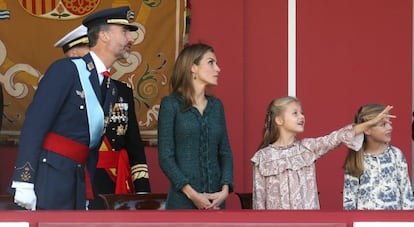After one year, King Felipe VI bolsters support for the Spanish monarchy
Metroscopia poll reveals that 81% of Spaniards approve of how he is carrying out his duties

A year on from the abdication of Spanish King Juan Carlos I, and the coronation of his son, Felipe VI, and the monarchy as an institution has been strengthened. That’s according to a Metroscopia study carried out for EL PAÍS, which shows that its approval levels among Spaniards have risen sharply in the last 12 months.
According to the poll, carried out on June 15 and 16, 81% of the Spanish population approves of the way in which King Felipe is carrying out his duties, while 74% of people surveyed approve of the actions of Queen Letizia.
A majority of those who say they will vote for Podemos also approve of Felipe
The high ratings come in the context of political tension in Spain following the May 24 municipal and regional elections, which saw the conservative Popular Party (PP) lose ground to emerging parties such as leftist anti-austerity group Podemos, and anti-corruption center-right party Ciudadanos.
According to the poll, 98% of those surveyed who say they vote for the PP approve of the way Felipe is carrying out his duties. The support from Socialist Party (PSOE) voters and those who support Ciudadanos is both 90%.
Meanwhile, a majority of those who say they will vote for Podemos – a party that has called for a reevaluation of the monarchy – also approve of Felipe. The king received the support of 64% of Podemos voters, and the queen, 62%.
Over the last 12 months the king has displayed prudence above all else, with highly measured speeches designed not to upset any social sectors. His strict defense of constitutional values and rights, combined with continuous allusions to the times and the new needs of society, have seen the monarchy left out of debates about the radical changes needed in Spain’s institutions.
In today’s Spain, the monarchy contributes to “the support and the safeguarding of the democratic system in moments of crisis,” according to 70% of those surveyed, among whom 49% say they are Podemos voters.
This institutional respect comes from the “impartial and non-partisan way” in which Felipe VI carries out his duties, according to 66% of the Spaniards surveyed. His work to “project a positive image of Spain abroad” was approved by 78% of the respondents.
Nothing that King Felipe has done over the last 12 months has caused controversy. The monarch has been holding continuous meetings with representatives from institutions, social and professional groups and political parties – and not just those from the government. A total of 63% of those interviewed believe that the monarchy stabilizes the state, “above and beyond the successive changes in the government.”
Felipe’s insistence on not appearing in a situation that is above the law has led him to distance himself from his sister Cristina
Felipe’s insistence on not appearing in a situation that is above the law has led him to distance himself greatly from his sister, the infanta Cristina. Last week the king saw to it that his sister was stripped of her title of Duchess of Palma, as a result of her involvement in a criminal embezzlement case involving the business dealings of her husband, Iñaki Urdangarin. The royal household was also quick to deny that the move had been her own initiative, as she later claimed.
A year ago, at his coronation ceremony, the king aligned himself with a diverse, plural Spain, in which there are “different forms of being Spanish.” His general approval, however, may come from an attitude he has maintained since he came to the throne last year, which he cited specifically in his speech to Congress: “One man is no more than another, unless he does more than another” – a quote from Cervantes’ Don Quixote.
Tu suscripción se está usando en otro dispositivo
¿Quieres añadir otro usuario a tu suscripción?
Si continúas leyendo en este dispositivo, no se podrá leer en el otro.
FlechaTu suscripción se está usando en otro dispositivo y solo puedes acceder a EL PAÍS desde un dispositivo a la vez.
Si quieres compartir tu cuenta, cambia tu suscripción a la modalidad Premium, así podrás añadir otro usuario. Cada uno accederá con su propia cuenta de email, lo que os permitirá personalizar vuestra experiencia en EL PAÍS.
¿Tienes una suscripción de empresa? Accede aquí para contratar más cuentas.
En el caso de no saber quién está usando tu cuenta, te recomendamos cambiar tu contraseña aquí.
Si decides continuar compartiendo tu cuenta, este mensaje se mostrará en tu dispositivo y en el de la otra persona que está usando tu cuenta de forma indefinida, afectando a tu experiencia de lectura. Puedes consultar aquí los términos y condiciones de la suscripción digital.









































